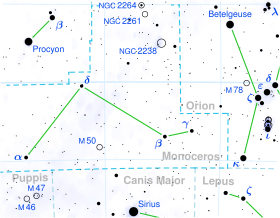19 Monocerotis

| Observation data Epoch J2000 Equinox J2000 | |
|---|---|
| Constellation | Monoceros |
| Right ascension | 07h 02m 54.77667s[1] |
| Declination | −04° 14′ 21.2377″[1] |
| Apparent magnitude (V) | 5.00[2] |
| Characteristics | |
| Spectral type | B2Vn(e)[3]or B1V[4] |
| U−B color index | −0.93[2] |
| B−V color index | −0.20[2] |
| Variable type | β Cep[5] |
| Astrometry | |
| Radial velocity (Rv) | +24.80[6] km/s |
| Proper motion (μ) | RA: −5.05[1] mas/yr Dec.: +2.24[1] mas/yr |
| Parallax (π) | 2.68 ± 0.22 mas[1] |
| Distance | 1,220 ± 100 ly (370 ± 30 pc) |
| Absolute magnitude (MV) | −2.85[7] |
| Details | |
| Mass | 12.3[8] M☉ |
| Radius | 9±3[9] R☉ |
| Luminosity | 4,817[7] L☉ |
| Surface gravity (log g) | 3.662[10] cgs |
| Temperature | 25,400[11] K |
| Rotational velocity (v sin i) | 274±3[9] km/s |
| Other designations | |
| Database references | |
| SIMBAD | data |
19 Monocerotis is a single,[12] variable star[5] in the equatorial constellation of Monoceros, located approximately 1,220 light years away from the Sun based on parallax.[1] It has the variable star designation V637 Monocerotis, while 19 Monocerotis is the Flamsteed designation. This object is visible to the naked eye as a faint, blue-white hued star with a baseline apparent visual magnitude of 5.00.[2] It is receding from the Earth with a heliocentric radial velocity of +25 km/s.[6]

This massive, B-type main-sequence star has a stellar classification of B1 V.[4] It is a Beta Cephei variable, ranging from 5.01 to 4.96 magnitude with a period of 0.19 days.[5] Closer examination shows there are three frequencies present, consisting of 5.22994, 0.17017, and 4.88956 cycles per day.[9] At one point it was thought to be a marginal Be star, but this was not confirmed.[9] The star is spinning rapidly with a projected rotational velocity of 274 km/s.[9] It has 12.3[8] times the mass of the Sun and is radiating 4,817[7] times the Sun's luminosity from its photosphere at an effective temperature of 25,400 K.[11]
References
[edit]- ^ a b c d e f Van Leeuwen, F. (2007). "Validation of the new Hipparcos reduction". Astronomy and Astrophysics. 474 (2): 653–664. arXiv:0708.1752. Bibcode:2007A&A...474..653V. doi:10.1051/0004-6361:20078357. S2CID 18759600. Vizier catalog entry
- ^ a b c d Ducati, J. R. (2002). "VizieR Online Data Catalog: Catalogue of Stellar Photometry in Johnson's 11-color system". CDS/ADC Collection of Electronic Catalogues. 2237. Bibcode:2002yCat.2237....0D.
- ^ a b "19 Mon". SIMBAD. Centre de données astronomiques de Strasbourg. Retrieved 2019-05-30.
- ^ a b Hoffleit, D.; Warren, W. H. (1995). "VizieR Online Data Catalog: Bright Star Catalogue, 5th Revised Ed. (Hoffleit+, 1991)". VizieR On-line Data Catalog: V/50. Originally Published in: 1964BS....C......0H. 5050. Bibcode:1995yCat.5050....0H.
- ^ a b c Samus, N. N.; Durlevich, O. V.; et al. (2009). "VizieR Online Data Catalog: General Catalogue of Variable Stars (Samus+ 2007-2013)". VizieR On-line Data Catalog: B/GCVS. Originally Published in: 2009yCat....102025S. 1. Bibcode:2009yCat....102025S.
- ^ a b Wilson, R. E. (1953). "General Catalogue of Stellar Radial Velocities". Carnegie Institute Washington D.C. Publication. Carnegie Institution of Washington. Bibcode:1953GCRV..C......0W. ISBN 9780598216885. LCCN 54001336.
- ^ a b c Anderson, E.; Francis, Ch. (2012). "XHIP: An extended hipparcos compilation". Astronomy Letters. 38 (5): 331. arXiv:1108.4971. Bibcode:2012AstL...38..331A. doi:10.1134/S1063773712050015. S2CID 119257644. Vizier catalog entry
- ^ a b Tetzlaff, N.; Neuhäuser, R.; Hohle, M. M. (2011). "A catalogue of young runaway Hipparcos stars within 3 kpc from the Sun". Monthly Notices of the Royal Astronomical Society. 410 (1): 190–200. arXiv:1007.4883. Bibcode:2011MNRAS.410..190T. doi:10.1111/j.1365-2966.2010.17434.x. S2CID 118629873. Vizier catalog entry
- ^ a b c d e Balona, L. A.; et al. (July 2002). "Short-period line profile and light variations in the Beta Cephei star 19 Monocerotis" (PDF). Monthly Notices of the Royal Astronomical Society. 333 (4): 952–960. Bibcode:2002MNRAS.333..952B. doi:10.1046/j.1365-8711.2002.05487.x.
- ^ Soubiran, Caroline; Le Campion, Jean-François; Brouillet, Nathalie; Chemin, Laurent (2016). "The PASTEL catalogue: 2016 version". Astronomy & Astrophysics. 591: A118. arXiv:1605.07384. Bibcode:2016A&A...591A.118S. doi:10.1051/0004-6361/201628497. S2CID 119258214.
- ^ a b Hohle, M.M.; Neuhäuser, R.; Schutz, B.F. (2010). "Masses and luminosities of O- and B-type stars and red supergiants". Astronomische Nachrichten. 331 (4): 349. arXiv:1003.2335. Bibcode:2010AN....331..349H. doi:10.1002/asna.200911355. S2CID 111387483. Vizier catalog entry
- ^ Eggleton, P. P.; Tokovinin, A. A. (September 2008). "A catalogue of multiplicity among bright stellar systems". Monthly Notices of the Royal Astronomical Society. 389 (2): 869–879. arXiv:0806.2878. Bibcode:2008MNRAS.389..869E. doi:10.1111/j.1365-2966.2008.13596.x. S2CID 14878976.
- ^ "MAST: Barbara A. Mikulski Archive for Space Telescopes". Space Telescope Science Institute. Retrieved 8 December 2021.
